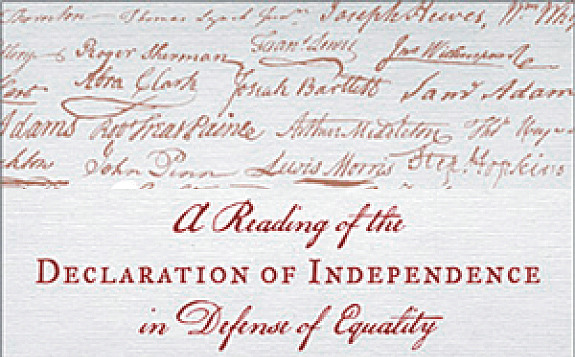The following text is excerpted from Our Declaration: A Reading of the Declaration of Independence in Defense of Equality (Liveright Publishing Corporation, 2014) by Danielle Allen, UPS Foundation Professor in the School of Social Science.
The Declaration of Independence matters because it helps us see that we cannot have freedom without equality. It is out of an egalitarian commitment that a people grows—a people that is capable of protecting us all collectively, and each of us individually, from domination. If the Declaration can stake a claim to freedom, it is only because it is so clear-eyed about the fact that the people’s strength resides in its equality.
The Declaration also conveys another lesson of paramount importance. It is this: language is one of the most potent resources each of us has for achieving our own political empowerment. The men who wrote the Declaration of Independence grasped the power of words. This reveals itself in the laborious processes by which they brought the Declaration, and their revolution, into being. It shows itself forcefully, of course, in the text’s own eloquence.
When we think about how to achieve political equality, we have to attend to things like voting rights and the right to hold office. We have to foster economic opportunity and understand when excessive material inequality undermines broad democratic political participation. But we also have to cultivate the capacity of citizens to use language effectively enough to influence the choices we make together. . . .
. . . . The single most transformative experience I had came from teaching the Declaration of Independence not to my bright-eyed undergraduates but to my life-tested night students. I sometimes taught it as part of the U.S. history unit, sometimes as part of the literature unit, and sometimes as part of the writing unit. Like the huge majority of Americans, few of my day students had ever read its 1,337 words from start to finish. None of my night students had.
I started teaching the text instrumentally. That is, I thought it would be useful. These students with jobs were busy. The Declaration is short. No one would complain about the reading. I could use it to teach history, writing, or political philosophy. And so I began.
My night students generally entered into the text thinking of it as something that did not belong to them. It represented instead institutions and power, everything that solidified a world that had, as life had turned out, delivered them so much grief, so much to overcome.
As I worked my way through the text with those students, I realized for the first time in my own life that the Declaration makes a coherent philosophical argument. In particular, it makes an argument about political equality. If the pattern of books published on the Declaration is any indication, we have developed the habit of thinking about the Declaration mainly as an event, an episode in the dramatic unfolding of the American Revolution. But it makes a cogent philosophical case for political equality, a case that democratic citizens desperately need to understand.
What exactly is political equality?
The purpose of democracy is to empower individual citizens and give them sufficient control over their lives to protect themselves from domination. In their ideal form, democracies empower each and all such that none can dominate any of the others, nor any one group, another group of citizens.
Political equality is not, however, merely freedom from domination. The best way to avoid being dominated is to help build the world in which one lives—to help, like an architect, determine its pattern and structure. The point of political equality is not merely to secure spaces free from domination but also to engage all members of a community equally in the work of creating and constantly recreating that community. Political equality is equal political empowerment. Ideally, if political equality exists, citizens become cocreators of their shared world. Freedom from domination and the opportunity for cocreation maximize the space available for individual and collective flourishing.
The assertion that the Declaration is about such a rich notion of political equality will provoke skepticism. Is it not about freedom? The text, after all, declares independence.
The Declaration starts and finishes, however, with equality. In the first sentence, the Continental Congress proclaims that the time has come for the people, which they now constitute, to take a “separate and equal” place among the powers of the earth. The last sentence of the Declaration finds the members of the Continental Congress, as representatives of their newly designated “states,” “mutually” pledging to each other their lives, their property, and their sacred honor. They stake their claim to independence—to freedom—on the bedrock of an egalitarian commitment to one another. Only on the basis of a community built with their equality can they achieve their freedom.
And, of course, there is also the all-important second sentence, which begins, “We hold these truths to be self-evident, that all men are created equal.”
As my night students metabolized the philosophical argument and rhetorical art of the Declaration, many of them, and I along with them, experienced a personal metamorphosis. They found themselves suddenly as political beings, with a consciousness that had previously eluded them. They built a foundation from which to assess the state of their political world. They gained a vocabulary and rhetorical techniques for arguing about it.
In reading the document with me, my students in fact regifted to me a text that should have been mine all along. They gave me again the Declaration’s ideals—equality and freedom—and the power of its language. They restored to me my patrimony as well as their own, and ours.
